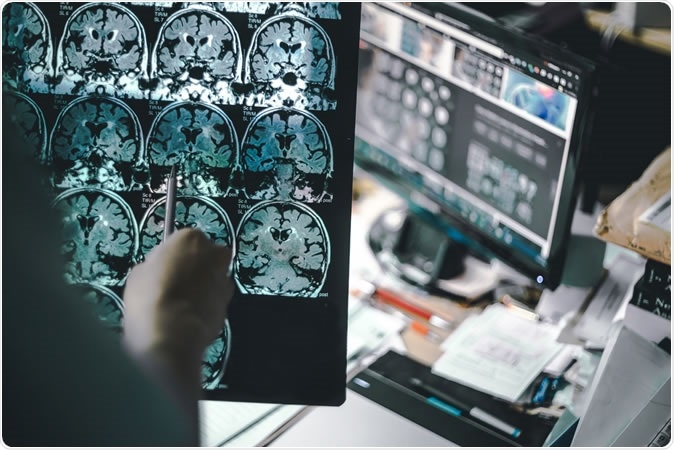Researchers from Salk have found that two experimental drugs named CMS121 and J147 may improve memory functions and reduce the progression of memory decline and brain degeneration in mice models of Alzheimer’s disease (AD). The researchers published their work in the latest issue of the journal eLife. The study was titled, “Elevating acetyl-CoA levels reduces aspects of brain aging.”

Image Credit: Atthapon Raksthaput / Shutterstock
The Salk researchers working with the two compounds reveal that these two can slow the aging process if aging mice by blocking the damage that is seen in the brain with age. Further the team also noted that these compounds can help restore the molecules that are reduced in aging brains and are found in abundance in younger brains. The team is hopeful that these results could help pave the way for new drugs that could be useful in patients with Alzheimer’s disease. Pamela Maher, a senior staff scientist at Salk, and one of the corresponding authors of the new paper said in a statement, “This study further validated these two compounds not only as Alzheimer's drug candidates but also as potentially more widely useful for their anti-aging effects.”
Antonio Currais, from Salk and the first author of the paper explained, “The contribution of old age-associated detrimental processes to the disease has been largely neglected in Alzheimer's disease drug discovery.” The two new compounds CMS121 and J147 were developed by Maher and David Schubert, the head of Salk's Cellular Neurobiology Lab. The origin or source of these compounds is medicinal herbs.
These compounds have been shown to keep the neurons alive even when they are exposed to stress related to aging and ultimately Alzheimer’s disease. These two compounds were found to be targeting molecular pathways that could help improve symptoms of aging and also improve longevity.
For this study the team took mice that were genetically tweaked so that they aged faster than normal mice. These were called the SAMP8 mice. This meant that their brains also showed the symptoms of aging faster than other mice. Some of the mice were then administered CMS121 or J147 started when the mice were 9 months old. Nine months of age for these mice was extrapolated to be middle age for a human. After using the drugs for around four months in the mice, they were given memory tests, behaviour tests and also genetic and molecular markers of their brains were tested.
At the end of the study, the team noted that the mice on either of the two experimental drugs performed better than the mice who had not been administered any drug. The team speculated that the effects of aging on the brain and resultant Alzheimer’s disease could have some interference with glucose metabolism and energy expenditure process. They wrote, “Clinical evidence shows that a decline in cerebral glucose metabolism (hypometabolism) precedes the pathology and symptoms of AD and is more severe than that observed in normal aging. Given that energy production from glucose supports the majority of brain activity as well as the maintenance of cellular homeostasis, it is likely that a failure to supply cells with adequate energy contributes to the neuropathological cascade in both aging and age-associated dementias such as AD.”
Next the team also looked at the brains and molecular markers therein. They noted that the brains of the treated mice also showed significant changes. Those on either CMS121 or J147 expressed certain genes within their mitochondria that are the seat for generating energy within them. These mitochondria did not show the age related changes. Maher said, “The bottom line was that these two compounds prevent molecular changes that are associated with aging.”
They explored the mitochondria and found that both of the experimental drugs raised the levels of the chemical acetyl-coenzyme A (acetyl-coA). They used an enzyme that breaks down the available acetyl-coA and found that these experimental drugs could still increase mitochondrial acetyl-CoA and thus improved its functions. This meant that the brain cells could resist the damages caused by the ageing process. Maher said, “There was already some data from human studies that the function of mitochondria is negatively impacted in aging and that it's worse in the context of Alzheimer's. This helps solidify that link.”
The team next plans to use the compounds on other animal models to see what are their effects on other organs. Currais explained, “We are now using a variety of animal models to investigate how this neuroprotective pathway regulates specific molecular aspects of mitochondrial biology, and their effects on aging and Alzheimer's.”
This study was supported by the National Institutes of Health, the Glenn Foundation for Medical Research, the Shiley Foundation and the Edward N. and Della L. Thome Memorial Foundation.
Journal reference:
Elevating acetyl-CoA levels reduces aspects of brain aging, eLife 2019;8:e47866 DOI: 10.7554/eLife.47866, https://elifesciences.org/articles/47866